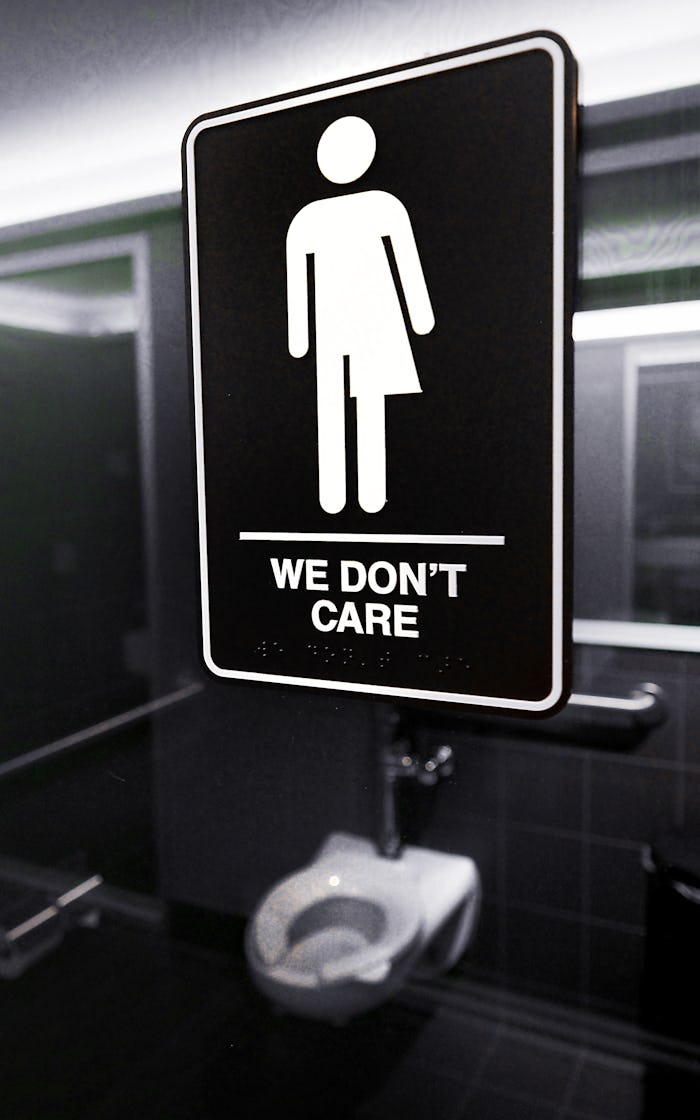News

How Bathroom Bills Affect Kids With Disabilities
Over the past year, Americans found themselves in a tense debate over North Carolina’s controversial House Bill 2 , better known as the “bathroom bill.” The 2016 legislation, which declared public restrooms are designated for use based on a person's "biological sex" that is stated on their birth certificate, put transgender rights under a national microscope. Amid all the controversy and the law’s eventual repeal, an important group was left out of the discussion — disabled children and their parents. As additional states like Texas gear up to pass similar legislation to H.B. 2, the parents of disabled children are fighting back against "bathroom bills" that they say place their loved ones in harm’s way.
According to the National State of Legislatures, at least 16 states have submitted H.B. 2 type bills in 2017. Given the looming threat of these laws, the parents of disabled children are speaking out on how this type of legislature specifically hurts their families. Not only does a “bathroom bill” ignore the need for disabled people to use the same restroom as their designated caregivers (who are often of a different gender), but it also puts them at jeopardy to be discriminated against with fines and criminal repercussions. Even worse, a disabled child using a restroom without any assistance is especially susceptible to danger.
Melissa Sharpe, the mom of a disabled child named Owen, explained to Today Parents just how scary her predicament can be:
[Owen] is oblivious to his surroundings all of the time. Owen is literally the real life embodiment of Buddy the Elf: He is naive and innocent and only ever sees the good in everyone. He would be such an easy target.
Sam Crane, the legal director and director of public policy for the nonprofit Autistic Self Advocacy Network, echoed Melissa's concerns to the Washington Post:
It appears that the bills’ supporters have given little or no thought to their potential effect on people with disabilities who need assistance in order to use the restroom. Many people with disabilities — including significant physical or developmental disabilities — are unable to use public bathrooms safely without assistance. Often, a person’s assistant will be someone of a different gender.
As for how many citizens "bathroom bills" could affect, the CDC states one in six kids (aged between 3-17) in America has a developmental disability. This statistic means a staggering number of parents would be forced to send their helpless children into uncharted territory if "bathroom bills" around the country begin to pass.
Unfortunately for the parents of disabled children in Texas, late Sunday night the House greenlit legislature to disallow transgender students in public and charter schools from using a bathroom that reflects their gender identity. Although this law isn't as broad as other proposed "bathroom bills" or the original H.B. 2, it sets a bad precedent of things to come. In fact, one disgusted citizen dubbed the evening as "Discrimination Sunday."
It's important to note, however, that the Texas bill has a similar exception to H.B. 2 regarding parents and caregivers. According to the law, "the student's parent, guardian, conservator, or authorized caregiver" may assist a child in the bathroom if necessary. Although this type of exception would seem to alleviate concerns about "bathroom bills," there still appears to be an onslaught of trepidation from the parents of disabled children over this type of legislation. That could be because fear of predators could lead citizens in these states to think those caregivers are actually predators, or a misunderstanding could lead to accidental charges against a caregiver. Although Texas offered exceptions in its bill, it's unclear if other states will follow suit, which could be cause for the outcry and fear.
As for those who cite family restrooms as a solution to concerned parents against "bathroom bills," many argue they're not practical or realistic. Wendy Greenawalt, another mom of a special needs child, argued to Today Parents:
In those large restrooms I've seen everything from people changing for work to moms monitoring the restroom use of their fully capable, ambulatory, older children. I've more than one time encountered a companion restroom being used for a lengthy period of time for a mom to nurse her baby. I've had people cut in front of me, bang on the door because I was taking too long.
Although the families of special needs children already face so many obstacles as it is, they're primed and ready to fight these "bathroom bills" head on. Considering the safety and privacy of countless children are at risk, it's important to support these parents through relentless advocacy. You don't have to be the parent of a disabled child to understand what's at stake if America continues to pass these detrimental "bathroom bills."